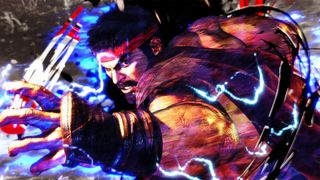Capcom stirs the pot, saying 'game prices are too low'
And doesn't think a recession will stop people spending money on games.

At TGS last week, Capcom president and CESA chairman Haruhiro Tsujimoto reignited everyone's favourite discourse subject: the price of games. As Nikkei (via Switchsoku) reports, Tsujimoto was discussing the topic of rising development costs, where he claimed that "game prices are too low".
While games from a lot of major publishers have become more expensive in recent years, it's worth noting that Capcom has not followed this trend. For instance, Street Fighter 6 launched at £50/$60 in June, whereas competitor Mortal Kombat 1 will set you back £60/$70. Meanwhile, games in general have not risen much since the beginning of the hobby, despite being considerably more expensive to make. One convincing way I've seen people make this point is by sharing brochures from Toys R Us and other retailers from the '90s, sometimes transposing the inflation-adjusted costs onto those old flyers to remind us that some of us were paying a contemporary $142 USD in '95 to play Donkey Kong Country 2 or $124 for Mortal Kombat.
That said, the reach of games has grown significantly over the decades, with publishers able to sell to a greater number of potential players. So while games have become more expensive to develop, at least at the level Tsujimoto was referring to, they also have the potential to generate more profits for the publisher.
The global cost of living has also risen significantly over the last year, and here in the UK we're dealing with a cost of living crisis, while Japan has only recently emerged from another recession. This is something Tsujimoto acknowledged, but only to the extent that he doesn't think it will stop people from buying games, regardless of their financial difficulties.
"Business confidence and high prices have little to do with the game industry," he said. "Just because there's a recession doesn't mean you won't go to the movie theatre or go to your favourite artist's concert. High-quality games will continue to sell."
An argument that will perhaps garner more sympathy than 'games are getting expensive to make' is that increasing the cost of games will also lead to an increase in wages. "Considering that wages are rising in the industry as a whole," he said, "I think raising unit prices is a healthy option for business." While many roles within game development are comparatively well paid, it's not the most stable career, with redundancies common and jobs being axed once games are shipped—if not before.
In the 2023 GDC State of the Industry survey, 16% of developers reported that they had changed companies in the last year, while 36% considered it, citing salary, company and culture and remote work as the main factors.
The biggest gaming news, reviews and hardware deals
Keep up to date with the most important stories and the best deals, as picked by the PC Gamer team.
But let's not forget the fact that Capcom just celebrated its best ever year in March. It sold a whopping 41.7 million games, 9 million more than the year prior, which led to record profiles. It's also enjoyed a decade of constant income growth. Naturally, this announcement inspired its share price to hit an all-time high of 5380 JPY at the time.
Capcom is not currently a publisher in trouble, and while new Resident Evil and Monster Hunter games are probably always going to sell decent numbers, it no doubt helps that they are cheaper than a lot of the competition. With this decade-long constant growth and record profits, maybe, just maybe, this very successful publisher could afford to shoulder rising development expenses and pay staff more without passing on the cost to players.

Fraser is the UK online editor and has actually met The Internet in person. With over a decade of experience, he's been around the block a few times, serving as a freelancer, news editor and prolific reviewer. Strategy games have been a 30-year-long obsession, from tiny RTSs to sprawling political sims, and he never turns down the chance to rave about Total War or Crusader Kings. He's also been known to set up shop in the latest MMO and likes to wind down with an endlessly deep, systemic RPG. These days, when he's not editing, he can usually be found writing features that are 1,000 words too long or talking about his dog.
Most Popular






